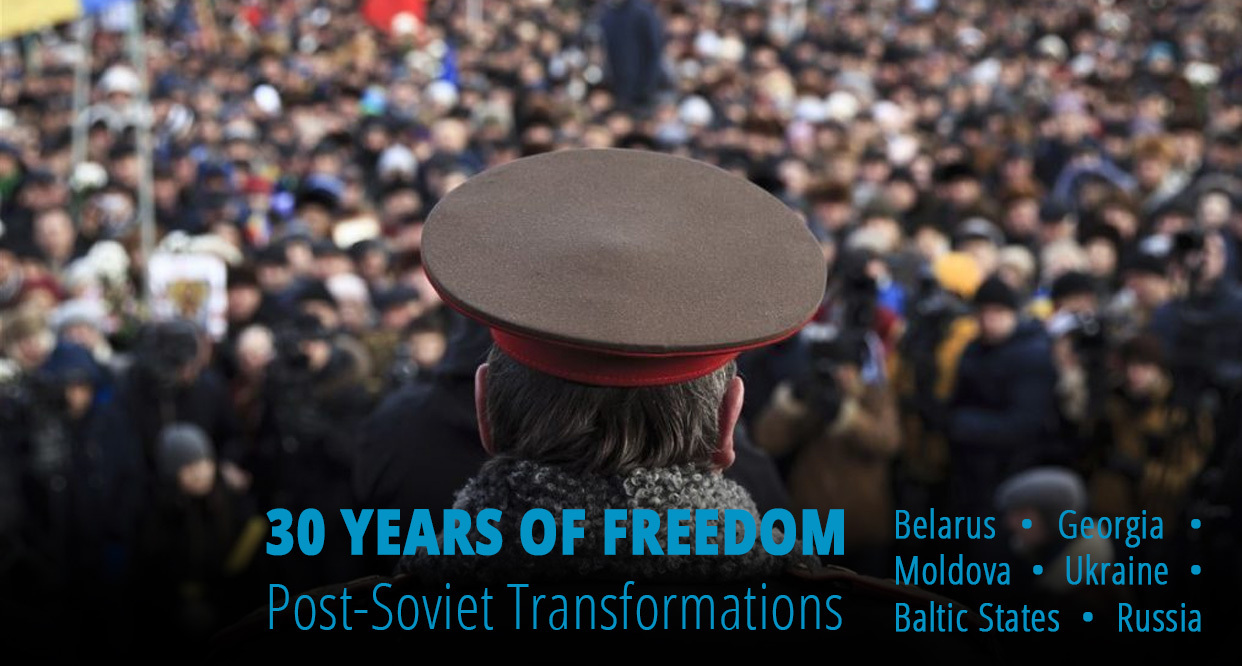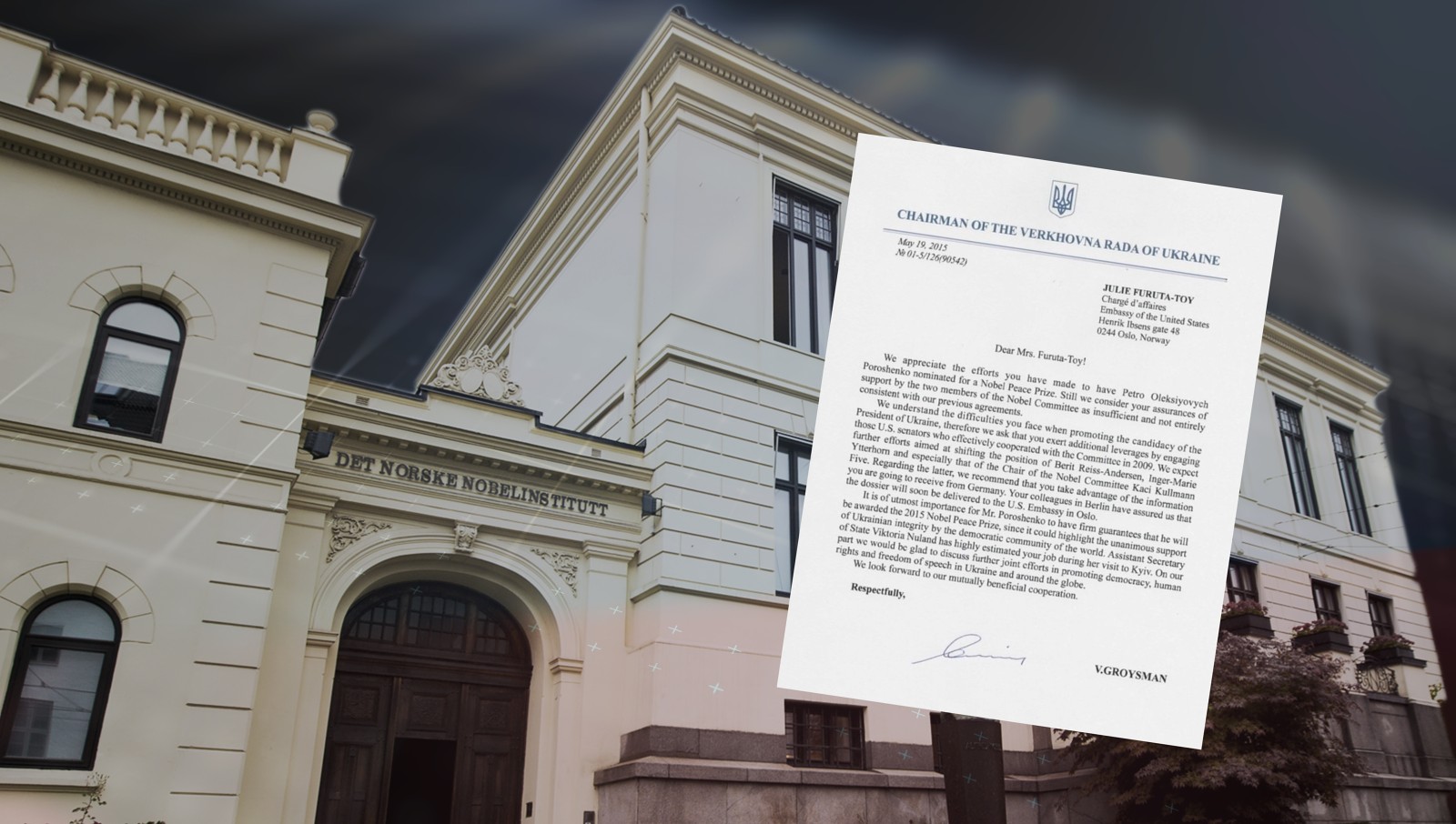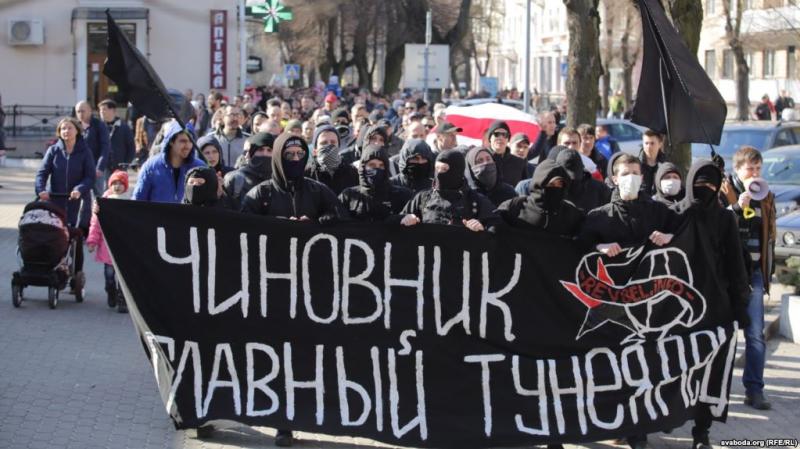Speaking with 10 intellectuals from post-Soviet states, including Ukraine, Belarus, Russia, Moldova, Georgia, and the Baltics, for the series “30 Years of Freedom,” Euromaidan Press drilled deep into the roots of oligarchs.
What gives them their strength? What is their good and bad influence? What progress has been made over the last 30 years in these different countries? And perhaps most significantly, how to meet the challenge of creating an open and competitive economy within a full democracy -- in spite of oligarchs.
This is Part Two of the four-part series, 30 Years of Freedom. All four series are based on the comments of our speakers, including quotes from their published essays.
- Part One. Demolishing monuments not enough to destroy post-Soviet nostalgia, but property rights help | 30 Years of Freedom, p.1
- Part Two. The post-Soviet oligarchies and how they shaped national state politics | 30 Years of Freedom, p.2
- Part Three. The end of the Soviet Man: How ex-USSR states forged their national identities, p.3
- Part Four. How to stop Russian wars in post-Soviet states? | 30 Years of Freedom, p.4
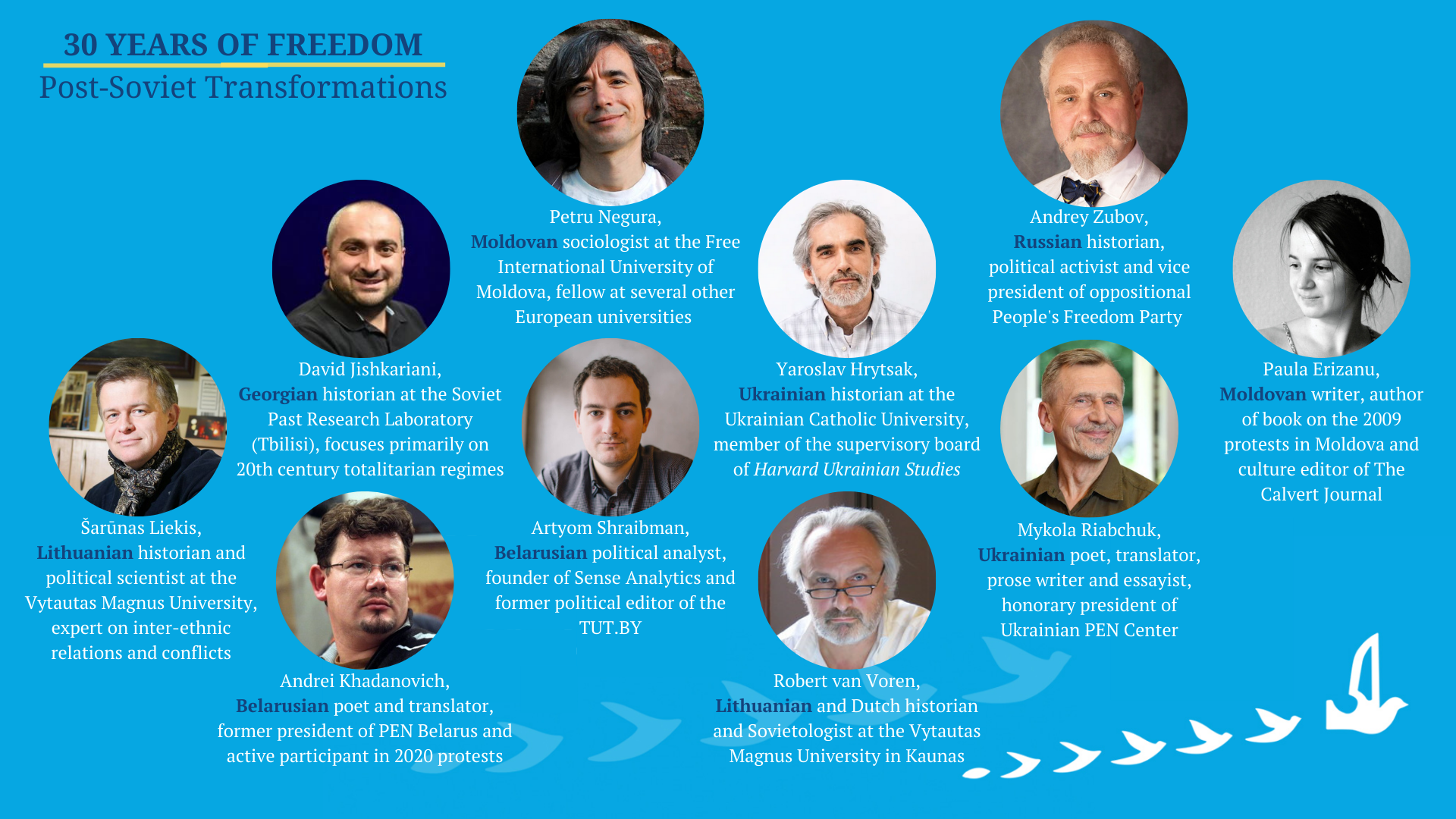
On the other hand, as Ukrainian historian Yaroslav Hrytsak notes, there are some good oligarchs who use their influence to serve their country or at least meet demands of civil society to become popular. Achievements relate to the many reforms that were successfully introduced after 1991.
The 2010s were the turning point, because strong parties and movements other than those of the oligarchy emerged. With varying success, some came to power, especially in Moldova and Ukraine.

Lithuania, Latvia, Estonia
Van Voren: Of course, you have a number of Lithuanians who managed quite cleverly to gather wealth and become the upper layer in society. But the extremes you see in Ukraine or Russia is something that didn’t happen in Lithuania. It was much more balanced. One of the reasons is that Lithuania was a democratic and independent state between the two World Wars. Therefore, a huge process of restitution occurred. Property went right back to the people or to the families that owned this property before the Soviet occupation.
And then, regarding the EU, my opinion is that from an economic perspective joining the EU by the Baltic states was far too quick. I understand politically why it was important because of a sense of security. But economically it very much created a two-tier society: the ones who managed to get big money and the ones who became very poor because prices skyrocketed.
Liekis: A lot of things were transformed because of EU and NATO membership, but in terms of hard power the Baltic states did not become more powerful than they had been.
They became like the EU, with a soft power of growing the GDP, but without hard power. Still, their GDP is gradually growing, mainly because of certain big business groups who privatized former state enterprises. Another reason is due to the rental type of economy. Big business gains huge profits and formally GDP grows, but society as a whole does not always benefit.
The issue is how to make the system work, not for the sake of a few but for wider distribution among people
Estonians did better because they were privatizing entire business entities. In Lithuania, they were privatizing on the basis of shareholding. For example, ownership of the factory is distributed to the workers. Somebody buys this and that and in reality you lose management and have looting. Usually the stronger -- those who have a greater stake in the business — defraud.
Estonia didn’t allow shareholding. The same in Poland. In Lithuania, we lost much more during the transition in several sectors, like industry and agriculture, because the state tolerated too much fraud in the structuring of business entities.
Ben: Who had money to privatize whole enterprises in Estonia?
Not the locals, usually foreigners coming in. Previously, the single owner was State Plan USSR. The question was what to do next? In Lithuania, the state basically took away all resources from the enterprises because of the lack of money in the economy, plus inflation.
In Estonia, when they found a buyer, the enterprise was sold as an autonomous entity with a governing body. At the very beginning, the flow of capital -- especially Scandinavian -- to Estonia was a lot.Lithuania and Latvia were lagging behind because they were taking very neoliberal positions.
Lithuania and Latvia were lagging behind because they were taking very neoliberal positions. Thus, Scandinavian money came here through Estonian financial institutions. Many Swedish banks were first established in Lithuania as a branch of Estonian banks.
Right now, Estonian dominance is no longer visible, but there was a period when Estonians were everywhere, because they did much better. Later, structural influence started to make a difference, especially in Lithuania because we had our Polish neighbors next door. Since Poles conducted rapid decentralization and attracted investments, especially from Germany, Lithuania became a type of extension of the German and Polish economy.At present, Lithuania in the Baltics is causing serious competition to the north
At present, Lithuania in the Baltics is causing serious competition to the north. The region around Kaunas in the south now has more potential than the whole of Latvia. These transformations were not easy, it took 30 years -- an entire generation.
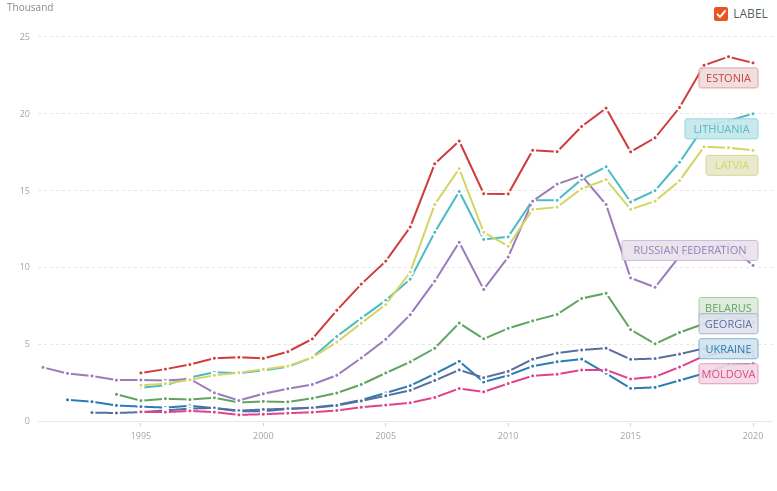
Land privatization
Regarding land privatization, right now, when you are having a discussion about land privatization in Ukraine, I’m on the side that cautions you to be very careful with this. You can create all kinds of latifundistas [owners of a very extensive piece of land -ed.], whereby huge owners are leasing the land in Ukraine.
Look at the Dutch Embassy, for example. How many agricultural attachés do they have in the embassy -- 13! They have an interest in land privatization. The Netherlands are small, overcrowded, but very efficient in agricultural production. They lack land and their businesses want to go to Ukraine and start enterprises there.
In Lithuania, they tried to establish restitution of the land ownership that existed before 1940. It created some problems, because land ownership at that time was in the hands of small owners with maybe three or five hectares, no more than 10. In 1939, a farmer could probably work these hectares as a livelihood, but nowadays you need at least 500 to run a farm.Over 30 years, the entire system of farming developed into a system of latifundia -- big owners
So, it created a class of small owners without modern equipment. Over 30 years, the entire system of farming developed into a system of latifundia -- big owners. The people who were owners of that land mostly became the underclass and migrated between Britain, Ireland, and so on. Large ownership of land doesn’t need this kind of workforce. Before, if I’m not mistaken about 10-15% of Lithuanians worked in agriculture. Right now, there are 2-3%. All the rest became a source of labor migration, like in Ukraine.

I think your state should be very careful in this transformation. It’s not like announcing a free market and letting everybody go. You have to look carefully after the interests of small owners and workers so that people get jobs, taxes are paid, and the land is not wasted.
I believe that ideologically these new political and economic elites take part in this neoliberal discourse, but the reality is that more and more people understand that the real interest lies in ruling.
Moldova
This is the main reason why there were neither significant reforms nor consolidation of a single power. The 2009 revolution ended Communist rule in Moldova, but only in 2015 did the first significant grassroots political parties emerge that won elections in 2021.
Erizanu: We share very much the same problem as Ukraine regarding privatization. It was not consistent across the post-socialist space. Obviously, it has affected the stratification of the population. We also have very weak state structures which get easily weaponized by these very wealthy people.
The big oligarchs are Vladimir Plahotniuc, Igor Dodon, and Veaceslav Platon. Plahotniuc was a dictatorial figure between 2016 and 2019, chairing the Democratic Party of Moldova and controlling government and parliament. Today he is self-exiled in Türkiye.We have oligarchs on all sides of the political spectrum
Platon was one of his friends but when they fell out, Platon found himself in prison. He has now been released and his influence is again on the rise.

There is also obviously Vlad Filat, founder of the Liberal Democratic Party of Moldova who served as prime minister in 2009-2013, then was imprisoned from 2015-2019. He came from a kind of reformist party. They had really good people in the team, but Filat’s corrupt leadership basically ruined that party.
We have oligarchs on all sides of the political spectrum. Plahotniuc, for instance, was supported for a while by the US Dodon is clearly pro-Russian and is getting money from Russia, as several reports have shown. The other oligarchs, like Platon, get their money from a combination of sources.
Ben: I would like to move to the 2009 revolution. You dedicated your first book to this event. What was the revolution about? Was it only about fair elections or something more?
The communist regime had been an authoritarian regime so the protest was against authoritarianism. But protesters were also motivated by the hope for a better life, for more freedom, and more prosperity. You know, when protests in Belarus erupted in August last year, I had flashbacks to April 2009. Partly because of the police brutality that we experienced as well.
But in 2009, Moldovan civil society and Moldovan protest was still taking place in a kind of outdated way, with a big stage and certain select speakers. We didn’t really have the small groups that we do now who bring spirit and creativity to protesting. There was a top-down structure of the protest. And a lot of the slogans people were chanting were outdated -- they were from the protests of the 1990s.
We were following a kind of pro-European route after 2009. But it wasn’t until 2021 that a real pro-European Moldovan party actually won a majority of votes in parliament. After 2009, we had progress in terms of media freedom.
The judiciary is the area that needs most reforming and is stagnating most. Because it was actually the judiciary that was helping corrupt oligarch politicians to stay in power and make money. Without a corrupt judiciary they would all be in prison now.

Negura: The revolution was labelled a Twitter revolution, which is correct because Twitter was becoming more and more popular, together with other platforms. But I call it the Stone Revolution, because people were throwing stones at parliamentary and presidential buildings.
But was it a revolution indeed? I’m not sure. There were several thousands of people protesting in the center of the city, but the majority of society was quite indifferent -- just going around, doing their thing and working like in everyday life. So, yes, some people protested and in quite a violent way, but that doesn’t make it a revolution in the sense that the whole society is throwing down a political power.

Opposition parties benefited from these protests. They provoked early elections, and came to power in the fall of 2009. It was quite a promising political change: democrats, liberals came to power and overthrew this Communist bullshit. But the very same democrats and liberals committed fraud and high-level corruption within the Moldovan state, starting in early 2010.The very same democrats and liberals committed fraud and high-level corruption. This is the great disappointment of our post-1991 transition
They made all these banking and financial frauds. So people again became disappointed -- now against these liberals and democrats and pro-Europeans. This is the great disappointment of our post-1991 transition.
In November 2014, a fraud with banks occured in Moldova, right at the night of elections several banks went bankrupt for the benefit of oligarchs and people lost money. Soon afterwards, and especially during 2015, new political forces started emerging.
First was the Dignity and Truth platform. In the beginning, it was a civic platform but then it became a political party. And then we had a second party emerging — Action and Solidarity of the current president Maia Sandu who won the election in 2021.
Both of these parties were grassroots parties emerging in the wake of popular disagreements with the oligarchs. I would say this was the moment that marked a turning point of the political field in Moldova reconfiguring itself -- because of these two parties.
Belarus
However, none of this will remain unchecked indefinitely -- civil society is in a state of protest-in-waiting. As soon as even a minor opportunity occurs, active protests will return.
Shreibman: We don’t have oligarchs -- not only because of the lack of privatization -- but because Lukashenka knows that oligarchs are a threat to his power. In 1994 and 1995, even before he destroyed Belarusian democracy, he destroyed or subjugated big businesses and big business owners.Lukashenka knows that oligarchs are a threat to his power
There had been some proto-oligarchs in Belarus, but most of them found themselves either in jail or in complete subjugation to Lukashenka. This is not to overlook the lack of privatization as one of the reasons for the absence of oligarchs.
In fact, most of the state assets lie in big industry, in fertilizers, in oil refineries, or elsewhere. And they are actually state-owned by none other than Lukashenka himself, effectively making him the sole oligarch in the country.
So, we don’t have the large numbers of oligarchs as do Ukraine or Russia -- instead we have one, the president himself. This has had a profound impact on politics, because if you have many oligarchs -- as is the case in Ukraine -- it is very hard for an authoritarian like Yanukovych, for example, to consolidate power throughout the country. Putin took several years to consolidate his power over Russian oligarchs; jailing Khodorkovsky, Abramovich, Berezovsky, Gusinsky, and others.
In Belarus, Lukashenka simply destroyed them outright. Thus, it’s next to impossible for revolutionary movements -- as in 2020/21 -- to find allies among powerful individuals like oligarchs, because there are none. Meanwhile, in Ukraine some oligarchs did indeed support the 2014 Maidan Revolution.

We don’t have any private TV channels in Belarus, only state-owned. There may be some private TV companies that broadcast on a regional level, but they are entirely entertainment-based -- no in-depth social/political content. The only exception is Belsat TV which is broadcast from Poland via satellites, and its journalists, who mainly reside in Belarus, are routinely arrested and repressed.Lukashenka personally appoints every mayor of every small town and every head of a district
Municipalities don’t have any autonomy, even economically. Lukashenka personally appoints every mayor of every small town and every head of a district, no matter how remote. There is virtually no freedom of any sort -- be it financial, political or administrative -- only departments of the presidential administration.
Ben: Is victory possible for protesters, or has the country fallen into a stalemate for at least five to ten years?
Obviously, it’s not possible to protest in the current environment, but this environment can change at any time. For example, if Lukashenka decides he wants to bargain with the West again. More so, if relations with Russia deteriorated again, then he might have to deliver a few concessions — at least for the West. Either way, he feels less secure because of sanctions and the decrease in foreign currency reserves.
Protests can erupt if the conditions for them are ripe. What we have now is the protest-in-waiting. Whether such conditions emerge entirely depends on the decisions of Lukashenka and his missteps. He has shown us repeatedly that he is capable of miscalculations, as in the recent story with Ryanair.
However, I’m not sure that the future protests of Belarus -- if they erupt -- will be as peaceful as in 2020/21. Many people have regretted these peaceful tactics. Many who protested themselves repeatedly -- often for months — and were then arrested or became disillusioned now regret they were not more assertive.
This means that when they come back to the streets, from their perspective they would look foolish to repeat what didn’t work last time. And that is why I’m not sure that the next round of protests in Belarus will be as peaceful as before.
This is a risk, given the Belarusian regime's brutality which can lead to massive casualties and to intervention from Russia. As you well understand, Russia considers every revolution in its neighborhood a threat to their own interests.
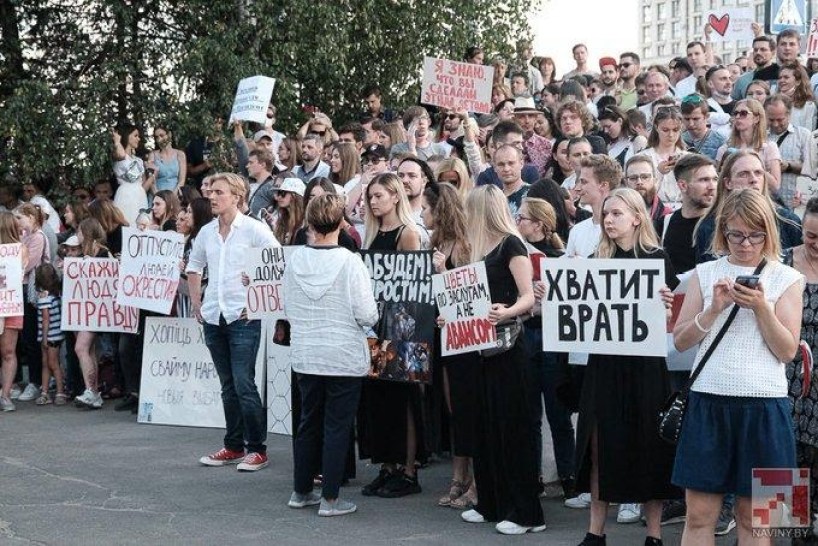
Ben: Preparing for the interview, I discovered that you have recently moved to Ukraine from Belarus. It is sad news that you had to leave your homeland. How do you feel living now in Ukraine?
Yes, this is a very unfavorable trend and a victory for the Belarus regime to a certain degree, because many activists have left and this saps steam from the kettle, so to speak. It’s also sad in terms of brain drain, because it’s not just political emigration. By some estimates, more than 20% of Belarusian IT specialists have left the country since 2020. Not all of these people will return, and neighbors like Ukraine, Poland, and Lithuania will benefit from it.Many activists have left and this saps steam from the kettle, so to speak
I’m relatively comfortable and okay in Ukraine. First of all I was lucky to leave without major obstructions. I didn’t take the direct route. I took a very elaborate way of getting out of the country, but in the end my family was able to unite with me.
I have my work. I continue working as an analyst. For many people this was a problem. Ukraine is a very hospitable place for people from Belarus, I mean mentality-wise we are close to each other and our languages are similar. Legally there are some problems. People especially complain about getting their residence permits -- the right to work. Otherwise Ukraine does a lot to support us and help us adapt.
Georgia
Jishcariani: In the 1990s, the economies of all Soviet republics were interconnected because they all existed in a world of mini-globalization, within the framework of the Soviet Union. After the collapse of the USSR, it was not clear how these economies should go forward.
In Georgia, mostly former communists or criminals accrued all the resources of the country during the privatization of state assets -- strategic resources. While quasi-criminal gangs took control over the economic life of the country.
People who had studied for well-paid technical professions during the Soviet era found that their professions were not needed anymore. In this regard, during the 1990s there was little difference between Georgia, Ukraine and Russia.
Regarding media, no independent TV channels exist in Georgia. Instead, almost all are controlled by today’s oligarchs or former criminal gangs who gained billions in the 1990s.
Ben: Your 2003 Rose Revolution seems quite similar to the 2004 Orange Revolution in Ukraine, and to the 2009 Stone Revolution in Moldova -- each fighting rigged elections and bringing to power reformers -- who, unfortunately, only managed to achieve limited success. Did Saakashvili (2004–07; 2008–13) succeed more in his reforms than Yushchenko (2004–09) in Ukraine?
When comparing Georgia and Ukraine, we need to compare their population numbers as well as their regional distribution, because these are two different countries. In 2003, regional political parties were much stronger in Ukraine — as were the oligarchs.
Since 2003, Georgians have succeeded in many respects. For example, corruption at universities was largely eradicated. Earlier, tuition was free but placement was awarded based on personal favor. Now, placement is based on merit. Corruption by officials, or in the workplace, for example by traffic police, is better controlled.
Societal norms started to improve and one could see real grassroots progress. Citizens started paying taxes straight away, with the reforms of Saakashvili. This was very important, because in the 1990s there was no culture of paying taxes. With Saakashvili, taxpayer numbers increased -- this is very important.

But on the other hand, corruption moved out of day-to-day society and penetrated the legal system, where criminals -- past and present -- could resume their economic command.
As a result, political forces controlled the economy — people who were supporting the National Movement [Saakashvili’s political party -ed.] and donating to the party were quite successful in doing business. Meanwhile, the political opposition was mostly thwarted and could not succeed in business.
Nonetheless, despite good GDP, we can say that since 2003 the gap between people who control everything and are very rich, and ordinary people -- even impoverished -- has become greater. These policies are in no way changing, and poverty in Georgia is increasing.
Ben: Is today’s Georgian Dream party (which declares a more leftist ideology and has ruled since 2013) the reaction to this gap between rich and poor?
I think this is the biggest problem, because out of 150 members of parliament, approximately 20 or 30 of them are millionaires. So, how is this a leftist party when the founder Ivanishvili is a billionaire and many members of parliament are millionaires? Not to mention that they control almost everything in Georgia, from construction to pharmacies, and more.Affiliates of main branches of the economy and their monopolies can now be found in the parliament of Georgia
Affiliates of main branches of the economy and their monopolies can now be found in the parliament of Georgia, and most of them are members of the Georgian Dream party.
So the Georgian Dream party is an absolutely, institutionally corrupt party. They may no longer be taking bribes from ordinary citizens, but they are in complete control of officials heading up business branches, and they prevent those outside of their power structure from earning money legitimately. Honest people are forced to do something else at a much lower pay.
But this policy really started under Saakashvili, because many of these millionaires who are now members of the Georgian Dream were once the biggest donors to the United National Movement. These donors are not changing, they are getting richer, and supporting any political party that feeds their interests. So, I think, the Georgian Dream is simply a continuation of the National Movement.
Russia
Zubov: In late February 2021, we discussed realistic goals at our party assembly. We have several of them.
First, Creation of a coalition of parties and movements that share our liberal values in general, such as those underway; namely, Alexei Navalnyi’s movement, Yabloko [United Democratic Party, centre-left opposition -ed.] — the Open Russia movement. However, as you see, one by one, these movements are being declared illegal by the authorities. It is dangerous even to mention them. Nonetheless, we continue to follow this direction.
I think the main problem of our liberal movement is its fragmentation. Another problem is that people are oriented predominantly towards certain leaders, like Navalnyi or Mikhail Kasianov, rather than ideas. This is not right, and this is why our party doesn’t strive for any leading role in this movement. We are ready to give leadership to other people — the main thing is to preserve the system of ideas and goals. When God wills, and Russia becomes a democratic state, then we will start competing.
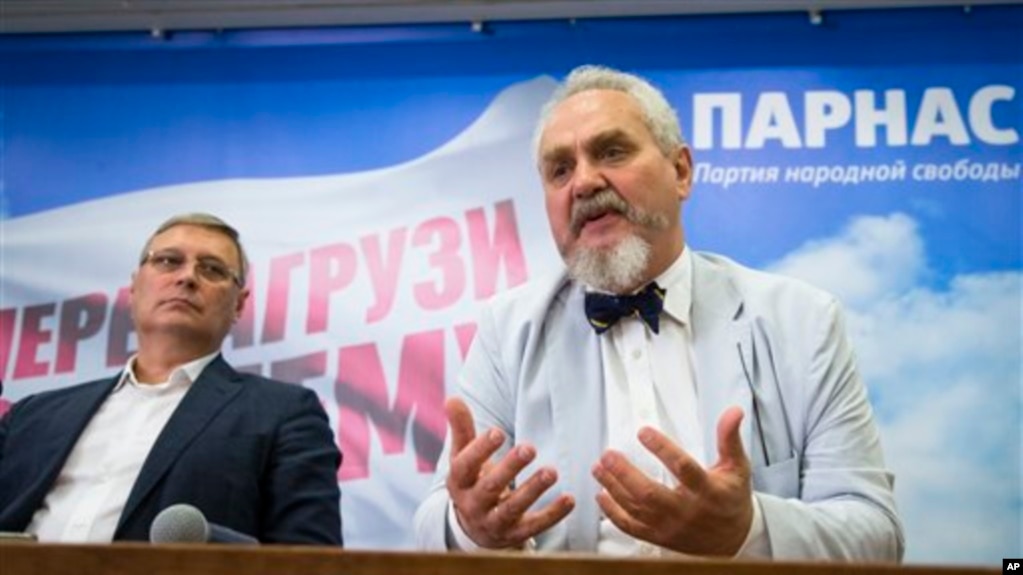
Second. Enlightenment. The big problem of our society is the lack of education. In many regards, it remains in the system of the Soviet intellectual and political paradigm. Partly, this explains the power of Putin’s regime.Putin is understandable. He is the same as Soviet general secretaries were before him. He is the headman
Putin is understandable. He is the same as Soviet general secretaries were before him. He is the headman. Many people like this, not all of course, but many. His goals are imperialistic, similar to the communist goals in the creation of the World International.
Education is needed. People should be taught that the contemporary world is living with totally different values from Russia. The work of our party and my personal work is dedicated to the goal of enlightenment for all post-Soviet states.
Ben: Did you expect that something like Maidan could ever happen in Ukraine?
No, I didn’t expect it -- I can say that directly. Also I didn’t expect that such events could happen in Belarus. This taught me a lot. I understood that the basis of these tyrannical regimes — be it Yanukovych’s, Lukashenka’s or Putin’s — is very weak.
We used to think (please don’t take offense) that Ukraine is quite a provincial state, that people are rather passive there and, although presidents change, it is controlled by oligarchs. I think Putin thought similarly.
But it turned out the other way. It turned out that Ukraine is absolutely different. Belarus, in this last year, also turned out to be absolutely different. When there were ques standing for hours to register Sviatlana Tsikhanovskaya as the candidate for the presidency, it was absolutely unbelievable for Belarus.
I was speaking a year before with Sviatlana Alexievich and other professors of Minsk University and they told me that Belarusians are a sleeping nation. But it turned out differently. Therefore, we can also expect that Russians can do more than we now think.
I think that Maidan, although it cost many lives, has taught us a lot, not only for the Russian people, but also for Putin. It's hard to see that people … nations … are much more sophisticated and decisive than it seems they are during calm times.
People don’t riot all the time; they live ordinary lives, bear children, have families, earn money, take holidays. But when a critical moment arrives, they all come together, as happened with Maidan – some to defend the nation, some to make food for the defenders.
It was not important why they came — it was important that almost everyone came out. My colleagues from Kyiv University, who work on Ancient Egypt, were all on Maidan. The same happened in Belarus – all my colleagues stood with the people.
Because of all of this, I believe that in a beautiful Russia of the future, in contemporary Ukraine and contemporary Belarus, there will be much strength to shake hands and help each other become a worthy part of Europe.
“We’re against the Putin regime!” Fifth day of protests in Russia’s Far Eastern city of Khabarovsk
Ukraine
The main shortcoming is the final incomplete step -- the reform of the judiciary and the full guarantee of private property rights. Despite all progress, this one shortcoming puts everything at risk and creates instability. Poroshenko — putting aside all of his achievements — didn’t dare to complete this one step. Zelenskyy, despite his obvious incompetence during his first months in office, still has the opportunity to complete this step and ensure his legacy in history.
Hrytsak: The Euromaidan 2014 revolution was different. Most new revolutions have ended in failure or are at a stalemate. The Ukrainian Maidan is one of the few revolutions that ended in victory. Of course, it was just a tactical victory — it eliminated only some negative scenarios of the corrupt Yanukovych government. In the long term, the success or defeat of a revolution is determined by whether the ruling elite have the will to radically change the country. We’ve been through three revolutions, but the changes were only partial so far.
Good and bad oligarchs
I do not consider the oligarchs to be completely negative actors. They are definitely lucky — after all, we don't know for sure how fairly or unfairly they acquired their millions. The point is that among them are those who think only about enrichment and those who actually think about what to do with their money. I know that from time to time they think about where to donate money — what to do with it. I know several oligarchs personally and I know that these are their thoughts.I do not consider the oligarchs to be completely negative actors
The advantage in Ukraine is that we have several oligarchs — and there is competition between those oligarchs. I think this element of competition is very important. We have a few channels, a few buttons, and no one has a monopoly.
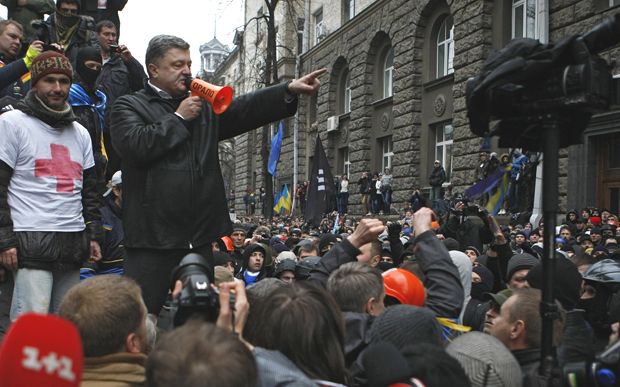
The last step
The key issue is to ensure the inviolability of private property, so that no oligarch can attack anyone else and try to bite off power. And it's not just about the oligarchs — but also about average business and average people.The key reform for me is judiciary reform
The key reform for me is judiciary reform. I believe that Ukraine has come a long way — 30 years — and has done so generally well. We have to go through a few last steps — but these steps are the most difficult, such as enacting the reform of the judiciary and creating a system of independent courts.
With this, the oligarchs cease to be dangerous. Maybe they remain caustic — so to speak — but not dangerous.
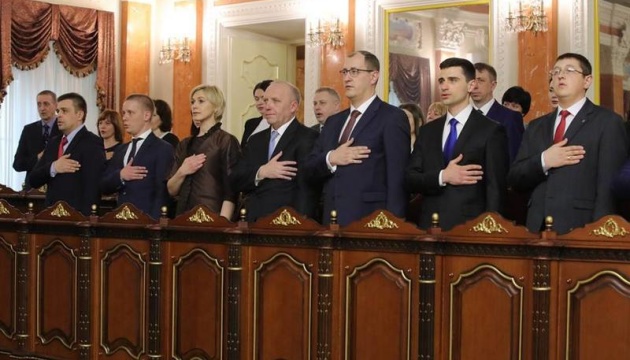
To conduct this, one needs political will. What is the formula for the success of reformers? The president should assemble a team of people who are smarter than him and let them do what they do best.
There was just such a moment when Kuchma [second Ukrainian president, 1994-2004 -ed.] came to power and gathered the reformers. And these couple of months of reforms survived very well, from the late 1990s until now. But the very process of reforming lasted only for a couple of months. Poroshenko maintained the process for two years.
I once wrote that Ukraine needed a third Maidan, but a third Maidan tied to the ballot box. I believe that there was an electoral revolution in 2019 when Zelenskyy was elected - a clear manifestation of Ukrainians' demand for change. Yes, initially Zelenskyy was a political project of oligarchs who control mass media and used this strong public demand to create a simulacrum of change. However, I do not rule out that Zelenskyy wants his place in history. And this is one of the ways — to gather a good team of professionals and instruct them to reform this country.
“Historical event” as Ukraine finally adopts all legislation for judicial reform
I know Poroshenko a little. I still believe in him. I can see how a person changes, grows, and so on. But he does not know how to delegate his power and authority. There was an anecdote about Poroshenko that he secretly sneaks into his office to clean it, because no one can clean as well as he does.
But a leader should be a little “lazy.” This is a precondition for everyone around him to work better. Leaders should not get involved in particular matters — instead delegate them.
How to convey this simple message to our political elite? Without offense, Zelenskyy came from business. That is another culture, you know, it's something else.
If he creates an independent judiciary during the remaining years of his power, he will surely gain a place in history. I think he is an ambitious person. That's why I say, if you want a place in history, take this last step.

